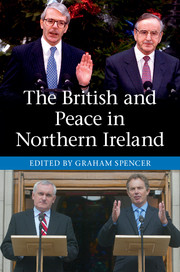Book contents
- Frontmatter
- Dedication
- Contents
- Notes on contributors
- Acknowledgements
- Brief chronology of the peace process
- Abbreviations
- Key documents
- Introduction
- 1 The terrain of discourse
- 2 The Anglo-Irish Agreement: an interview with Sir David Goodall and Lord Armstrong of Ilminster
- 3 The constitutional issue in Irish politics
- 4 Negotiations and positions: an interview with Sir John Chilcot
- 5 Resolving intercommunal conflict: some enabling factors
- 6 Tactics, strategy and space
- 7 The Joint Declaration and memory
- 8 Movement and transition in 1997: Major to Blair
- 9 The challenge of symmetry in dialogue: an interview with Sir Joseph Pilling
- 10 Why was the Good Friday Agreement so hard to implement?: lessons from ‘Groundhog Day’, 1998–2002
- 11 Text and context: an interview with William Fittall
- 12 The nature of dialogue: an interview with Sir Jonathan Phillips
- 13 Managing the tensions of difference: an interview with Jonathan Powell
- Conclusion
- Index
- References
1 - The terrain of discourse
Published online by Cambridge University Press: 05 March 2015
- Frontmatter
- Dedication
- Contents
- Notes on contributors
- Acknowledgements
- Brief chronology of the peace process
- Abbreviations
- Key documents
- Introduction
- 1 The terrain of discourse
- 2 The Anglo-Irish Agreement: an interview with Sir David Goodall and Lord Armstrong of Ilminster
- 3 The constitutional issue in Irish politics
- 4 Negotiations and positions: an interview with Sir John Chilcot
- 5 Resolving intercommunal conflict: some enabling factors
- 6 Tactics, strategy and space
- 7 The Joint Declaration and memory
- 8 Movement and transition in 1997: Major to Blair
- 9 The challenge of symmetry in dialogue: an interview with Sir Joseph Pilling
- 10 Why was the Good Friday Agreement so hard to implement?: lessons from ‘Groundhog Day’, 1998–2002
- 11 Text and context: an interview with William Fittall
- 12 The nature of dialogue: an interview with Sir Jonathan Phillips
- 13 Managing the tensions of difference: an interview with Jonathan Powell
- Conclusion
- Index
- References
Summary
When I think of the Northern Ireland peace process I am often reminded of the costly efforts to ascend Mount Everest, the loftiest summit in the world. We all remember and honour Hillary and Tenzing, but, of course, their expedition was far from the first to tackle with courage that dangerous and challenging task. Each successive expedition was able to learn something from the costly failure of its predecessors. Too many gallant mountaineers earned their place in the Sisyphus club of mountaineering. But, in mountaineering at least, there is a finite summit. Politics can present a different type of challenge, and how many ‘summit conferences’ have wrestled with the same problem?
I wish, too, to reflect on a different aspect of the process. Politicians speak to Parliament or the public. Governments publish Green Papers to stimulate discussion or White Papers to declare new policy. But it is no secret that such documents do not necessarily flow entirely from the pens of the responsible politicians. Some of these, of course, have the flair of effective presentation. I think of those such as Chris Patten, whose public utterances bore the imprint of his own polished composition and delivery. However, the general public has little understanding of the multiple and disparate pressures of ministerial life. The reality is that others often suggest words for their spoken or written pronouncements. This is far from meaning that these anonymous draftsmen own the ideas as well as the words in which they are expressed. The speechwriter or policy draftsman seeks to know and understand the policies and objectives of his principal. He must become used to amendment, evisceration or outright rejection of his efforts. In the far-off days of the Stormont Government we would minute our ministerial chiefs. With the introduction of direct rule and the arrival of William Whitelaw, the Northern Ireland Civil Service (NICS) had to adopt the new terminology of the ‘submission’. Often, an important document would go through draft after draft, with the ultimately approved document no more than a distant relative of the first effort. Without naming names, I recall one minister who was so pernickety about marginalia that the process seemed endless, but without much useful change to the essential substance.
- Type
- Chapter
- Information
- The British and Peace in Northern IrelandThe Process and Practice of Reaching Agreement, pp. 17 - 32Publisher: Cambridge University PressPrint publication year: 2015



